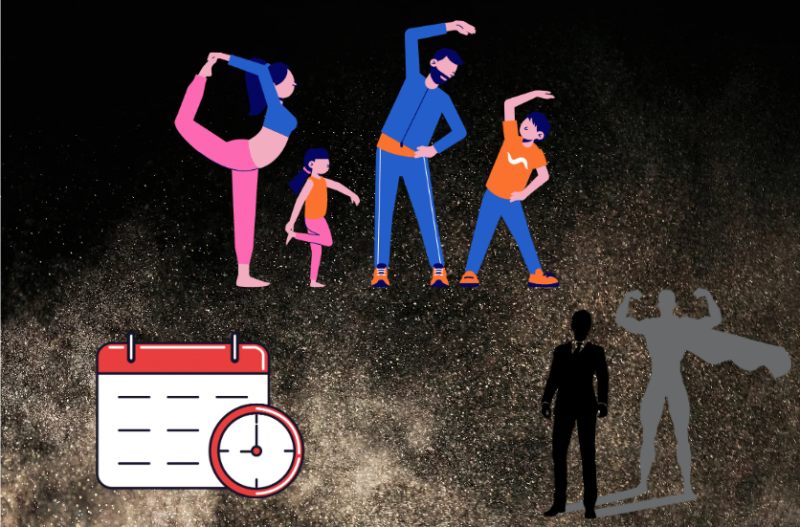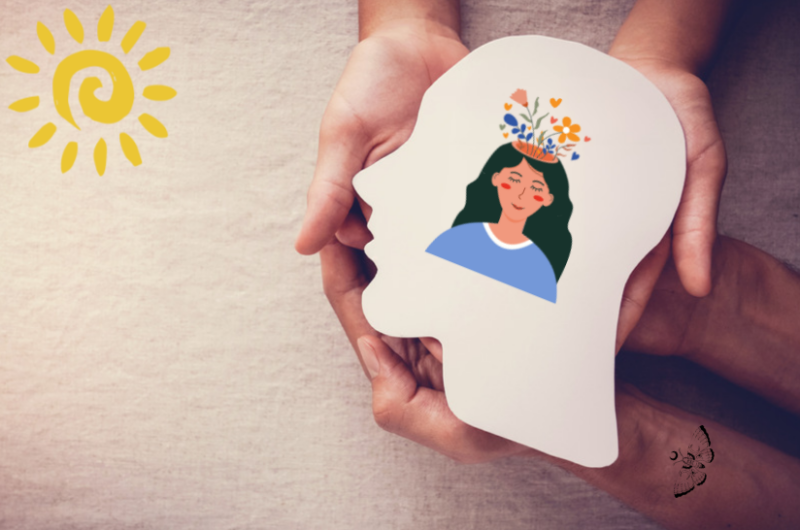Life is an ever-changing voyage, and at its core lies the constant quest for self-improvement. Self-improvement is not about seeking perfection, but rather about continuous growth and development.
It’s a process of self-discovery and transformation, and one of the most effective ways to embark on this journey is through cultivating healthy habits. Embracing healthy habits is like planting seeds of positivity and nourishing them daily to bloom into a fulfilling life.
This journey is not an overnight miracle but rather a collection of small steps taken consistently in the right direction. Each person’s path to self-improvement may differ, but there are foundational habits that prove transformative for most individuals.
Our top 12 recommendations:
1. Setting Clear Goals

The first step in any self-improvement journey is defining a clear vision of where you want to go. Setting meaningful and achievable goals gives you direction and purpose. Take some time to reflect on your aspirations, both short-term and long-term.
Ask yourself what you truly desire in different areas of your life – career, relationships, health, and personal growth. Once you have a vivid picture of your vision, jot down specific and realistic goals that align with it. While it’s essential to have ambitious long-term goals, they can sometimes feel overwhelming.
To avoid feeling daunted, break these big goals down into smaller, manageable steps. Each small step you take towards your ultimate objective brings you closer to success and keeps you motivated along the way. Celebrate these small victories, as they are the building blocks of your self-improvement journey.
Monitoring your progress is vital in the pursuit of self-improvement. Keep a journal or use technology to track your achievements, challenges, and setbacks. Regularly assess your journey, and if necessary, adjust your goals and strategies accordingly.
Embrace flexibility and understand that setbacks are a natural part of the process. It’s the ability to adapt and persevere that ultimately propels you forward on your path to self-betterment.
2. Creating a Daily Routine

Our lives are often filled with numerous commitments and distractions, making it easy to lose sight of our self-improvement goals. One of the most effective ways to stay on track is by establishing a structured daily routine.
Plan your day mindfully, ensuring you allocate time for essential activities, self-improvement practices, and leisure. A well-structured routine provides a sense of stability and control, which can alleviate stress and anxiety.
Amidst the hustle and bustle of daily life, it’s crucial to allocate time for self-reflection and personal growth. Regularly assess your progress, identify areas for improvement, and celebrate your achievements. Engage in self-reflection through meditation, journaling, or simply spending quiet moments alone.
Self-awareness is a powerful tool that enables you to understand your strengths, weaknesses, and values, ultimately leading to a deeper understanding of yourself and your aspirations. While having a daily routine is essential, it’s equally vital to strike a balance between productivity and relaxation.
Overburdening yourself can lead to burnout, hindering your progress. Incorporate breaks and leisure activities into your schedule to recharge and rejuvenate.
3. Regular Exercise and Physical Activity

Physical health and mental well-being are intricately connected. Regular exercise not only improves physical fitness but also has profound effects on mental clarity, mood, and overall happiness. Engaging in physical activity releases endorphins, the “feel-good” hormones that reduce stress and anxiety while boosting your energy levels.
Whether it’s going for a jog, practicing yoga, or participating in a team sport, find an activity that brings you joy and makes you feel good about yourself. Not everyone enjoys the same type of exercise, and that’s perfectly fine. The key is to find activities that resonate with you and fit your lifestyle.
Experiment with various exercises until you discover what brings you the most pleasure and motivation. This way, you’re more likely to stick to your routine and enjoy the process.
Additionally, consider incorporating physical activities into your daily life, such as walking or biking instead of driving, taking the stairs instead of the elevator, or doing simple stretches throughout the day. Incorporating regular exercise into your daily routine may face challenges, especially when life gets busy.
To stay consistent, set realistic goals and prioritize your well-being. Remember that even short bursts of physical activity can be beneficial. Find a workout buddy or join a fitness class to add a social element to your exercise routine, which can make it more enjoyable and help you stay committed.
Over time, exercise will become a habit, and the positive impact on your physical and mental health will reinforce your commitment to self-improvement.
4. Practicing Mindfulness and Meditation

In our fast-paced and technology-driven world, it’s easy to get caught up in the chaos and lose touch with the present moment. Mindfulness is the practice of being fully aware of your thoughts, feelings, sensations, and surroundings without judgment.
By cultivating mindfulness, you can develop a greater sense of self-awareness and be more attuned to the world around you. Practicing mindfulness in everyday activities, such as eating, walking, or even doing household chores, allows you to savor the present and find joy in the simple things.
Meditation is a powerful tool to complement mindfulness, providing numerous benefits for mental well-being. Regular meditation sessions can help reduce stress, anxiety, and depression while improving focus, memory, and emotional regulation. It allows you to create a sacred space for introspection and self-discovery.
There are various meditation techniques you can explore, such as mindfulness meditation, loving-kindness meditation, or guided visualization. Find the one that resonates with you and commit to incorporating it into your daily routine. Developing resilience is essential in navigating difficult times in life.
Mindfulness and meditation foster resilience by training your mind to embrace the present moment and accept things as they are. This mindset shift enables you to adapt to change more gracefully and find strength in the face of adversity.
As you cultivate mindfulness and meditation practices, you’ll find yourself better equipped to handle life’s ups and downs with greater composure and grace.
5. Reading and Continuous Learning

Reading is a gateway to a world of knowledge, insights, and experiences. Books offer valuable wisdom passed down through generations and perspectives from diverse minds. Engaging in regular reading exposes you to new ideas, challenges your thinking, and broadens your horizons.
Aside from books, there are countless sources of information and learning available at your fingertips. Online courses, podcasts, webinars, and workshops are just a few examples of platforms where you can gain knowledge and acquire new skills. Embrace a growth mindset, always seeking opportunities to learn and improve yourself.
The more you invest in your continuous learning, the more you’ll develop as an individual, both personally and professionally. While consuming information is essential for self-improvement, it’s crucial to find a balance in the amount and type of content you engage with.
In the digital age, we are bombarded with information from various sources, some of which may be overwhelming or misleading. Practice discernment and critical thinking when evaluating information. Focus on quality over quantity, and ensure that the information you consume aligns with your values and goals.
Remember to take breaks from information overload and give yourself time to reflect on what you’ve learned.
6. Nurturing Healthy Relationships

The people we surround ourselves with significantly impact our lives and personal growth. Positive, supportive relationships can uplift us, motivate us, and provide a sense of belonging. Evaluate the people in your life and assess whether they contribute positively to your well-being and growth.
Surround yourself with individuals who inspire you, challenge you to be better, and genuinely care about your success. Effective communication is the foundation of healthy relationships. Practice active listening, empathy, and open dialogue to foster meaningful connections with others.
Engage in conversations that encourage growth and mutual understanding. Be willing to share your thoughts and feelings openly, as vulnerability often strengthens the bonds between individuals. Nurturing healthy relationships requires effort and time, but the rewards of having a supportive network are immeasurable.
It’s equally important to set boundaries and recognize toxic relationships. Toxic relationships can drain your energy and hinder your personal growth. Identify patterns of negativity, disrespect, or emotional manipulation in any relationship, and consider if it’s in your best interest to let go.
Establishing healthy boundaries allows you to protect your well-being and invest your time and energy in nurturing relationships that contribute positively to your self-improvement journey.
7. Prioritizing Mental Health

Mental health is as crucial as physical health, yet it’s often overlooked or stigmatized. Prioritizing your mental health means recognizing when you need support and seeking it without hesitation. Understand that everyone faces challenges, and it’s okay to ask for help.
Whether it’s talking to a trusted friend or seeking professional counseling, reaching out for support is a sign of strength, not weakness. Stress is a natural part of life, but chronic stress can have detrimental effects on mental and physical well-being. Implement stress-relief techniques into your daily routine to manage stress effectively.
These techniques may include mindfulness, meditation, deep breathing exercises, spending time in nature, or engaging in creative activities. Experiment with various methods and identify what works best for you to alleviate stress and promote emotional balance.
Self-compassion involves treating yourself with the same kindness and understanding that you would offer to a friend. Embrace self-compassion in your self-improvement journey, recognizing that it’s normal to make mistakes and face setbacks.
Rather than being overly critical of yourself, practice self-acceptance and view mistakes as opportunities for growth and learning. Treat yourself with the same compassion and understanding that you would extend to others, fostering a positive and nurturing relationship with yourself.
8. Limiting Screen Time and Digital Detox

In our technology-driven world, screens have become an integral part of daily life. However, excessive screen time can take a toll on your well-being. From the blue light affecting sleep patterns to the addictive nature of social media, constant screen exposure can disrupt your focus, increase stress, and negatively impact mental health.
It’s essential to be mindful of your screen usage and take steps to limit it when necessary. Start by setting specific boundaries for screen time, both in terms of duration and timing. Designate “tech-free” zones or hours in your home to create opportunities for relaxation and genuine connections with loved ones.
Engage in hobbies or activities that don’t involve screens, such as reading a physical book, practicing a craft, or spending time outdoors. Consider participating in digital detox challenges, where you intentionally disconnect from screens for a designated period to recharge and reconnect with the present moment.
Technology can be a powerful tool for learning, communication, and productivity when used mindfully and in moderation. Instead of mindlessly scrolling through social media, be intentional about how you use technology.
Unfollow accounts that trigger negative emotions, curate your social media feed to be more uplifting and educational, and set specific times for checking emails and notifications.
9. Practicing Gratitude and Positive Thinking

Gratitude is a transformative practice that shifts your focus from what you lack to what you already have. By acknowledging and appreciating the positive aspects of your life, you cultivate a sense of contentment and fulfillment. Start a gratitude journal and write down things you are grateful for each day.
It could be as simple as a beautiful sunset, a loving gesture from a friend, or a moment of laughter. Over time, you’ll notice a shift in your perspective, and even in challenging times, you’ll find something to be grateful for. Positive thinking is a powerful force that shapes your outlook on life and influences your actions.
When you approach situations with a positive mindset, you’re more likely to find solutions, embrace opportunities, and attract positive experiences. Instead of dwelling on failures or setbacks, focus on the lessons learned and the potential for growth.
Practice affirmations and visualizations to reinforce positive beliefs about yourself and your capabilities. As you cultivate a positive mindset, you’ll become more resilient, optimistic, and better equipped to navigate life’s challenges. Incorporate self-compassion and compassion towards others into your daily interactions.
Be forgiving of yourself when you make mistakes and extend the same forgiveness to those around you. Practicing compassion cultivates empathy and strengthens your connections with others, leading to a more harmonious and supportive environment.
10. Journaling for Self-Reflection

Journaling is a powerful tool for self-reflection and self-discovery. Writing down your thoughts, emotions, and experiences provides a safe space to explore your inner world. Use your journal to reflect on your goals, progress, and setbacks.
Identify patterns of behavior or thought that may be holding you back, as well as your strengths and areas for improvement. Journaling fosters self-awareness and helps you gain deeper insights into your emotions and motivations. Writing can be therapeutic, providing an outlet to express your feelings and thoughts without judgment.
When faced with challenges or difficult emotions, turn to your journal to process them. Use writing to release pent-up emotions, clarify your thoughts, and find solutions to problems. Whether you write prose, poetry, or stream-of-consciousness, the act of putting pen to paper can be profoundly cathartic and healing.
Your journal can also serve as a place to set specific self-improvement goals and track your progress towards them. Write down your aspirations and the steps you plan to take to achieve them. Regularly review your journal to monitor your growth and celebrate your achievements.
Witnessing your progress on paper reinforces your dedication to self-improvement and provides motivation to continue moving forward.
11. Healthy Eating Habits

A balanced and nutritious diet is fundamental to overall well-being and self-improvement. Focus on incorporating whole, unprocessed foods into your meals, such as fruits, vegetables, whole grains, lean proteins, and healthy fats. Be mindful of portion sizes and avoid excessive consumption of sugary or processed foods.
Nourishing your body with the right nutrients provides you with the energy and vitality needed to pursue your goals and lead a fulfilling life. The food we consume not only impacts our physical health but also influences our mood and mental clarity.
Research has shown that certain foods, such as those rich in omega-3 fatty acids, antioxidants, and probiotics, have a positive effect on brain health and cognitive function. On the other hand, a diet high in sugar and unhealthy fats can contribute to inflammation and negatively affect mental health.
Mindful eating involves paying attention to the sensory experience of eating, such as the taste, texture, and aroma of the food, as well as recognizing hunger and fullness cues. Slow down during meals, savor each bite, and avoid distractions like screens or stressful conversations.
12. Embracing Resilience and Adaptability

Resilience is the ability to bounce back from setbacks, adapt to change, and thrive in the face of adversity. It’s a crucial trait to develop on your self-improvement journey, as challenges and obstacles are inevitable. Embrace failures and setbacks as opportunities for growth and learning.
Cultivate a positive attitude and believe in your ability to overcome challenges. Resilience is not about avoiding difficulties but rather facing them with courage and determination. Change is a constant in life, and being adaptable is essential for personal growth and self-improvement.
Embrace change as an opportunity for new experiences and growth, rather than resisting it out of fear or discomfort. Stay open to new ideas and perspectives, and be willing to adjust your goals and strategies as needed. By being adaptable, you’ll be better equipped to navigate life’s uncertainties and make the most of every situation.
FAQs:
How can I maintain a sense of balance while incorporating these habits into my life?
Finding balance involves prioritizing and adjusting these habits according to your responsibilities and personal preferences. Regular self-assessment will help you fine-tune your approach.
What are some self-improvement books you recommend for beginners?
Some popular self-improvement books for beginners include “The Power of Habit” by Charles Duhigg, “Atomic Habits” by James Clear, and “The Subtle Art of Not Giving a F*ck” by Mark Manson.
How can I stay motivated to maintain these healthy habits over time?
Remind yourself of the benefits these habits bring, celebrate your successes, and surround yourself with supportive people to stay motivated.
What are some simple ways to start implementing these habits in daily life?
Start by setting small, achievable goals for each habit and gradually build on them. Consistency is key to success.
What are positive affirmations, and how do they aid in the whole process?
Positive affirmations are empowering statements that help challenge negative thoughts and beliefs, promoting self-confidence and personal growth.
Final thoughts
Embrace the power of healthy habits in shaping your life and becoming the best version of yourself. As you set clear goals, establish a daily routine, practice mindfulness, nurture relationships, and prioritize your well-being, you’ll experience profound changes that ripple through all aspects of your life.
Remember that self-improvement is not about achieving perfection but about progress and evolution. Celebrate your achievements, learn from your setbacks, and stay committed to the path of growth. With dedication, resilience, and an open mind, you have the power to shape a life filled with purpose, fulfillment, and boundless possibilities.
The journey to becoming your best self is a lifelong adventure – embrace it wholeheartedly and enjoy the transformational ride.






